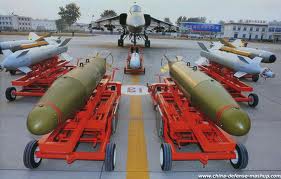Inside the Murky World of Arms Smuggling
May 16, 2012
By VICTOR THORN | AMERICAN FREE PRESS | MAY 16, 2012
Union Gen. William Tecumseh Sherman once said, “War is hell.” But to those who profit off the sale of weapons, war is big business that brings in huge profits. That explains why, even in these tough economic times, global weapons sales are booming, with U.S. corporations being some of the biggest arms peddlers.
The global arms market can be split into three sectors: First are the legal sales whereupon governments buy arms from corporations. Second are sales on the black market. And third is a legally gray area where governments, militaries and intelligence agencies rub shoulders with shady and corrupt dealers in order to carry out covert agendas such as regime changes and assassinations.
On March 2, Richard Norton-Taylor, reporting for The Guardian, wrote: “Sales of weapons and military services exceeded $400B in 2010 . . . [and] the top 10 arms producing companies account for 56% of total arms sales.”
To Americans, what should be most troublesome is the role the United States plays in bombarding the world with deadly weaponry in this half-trillion dollar market.
In a recent article entitled “America: Arms Dealer to the World,” reporter William Astore wrote, “From 2006 to 2010, the U.S. accounted for nearly 1/3 of the world’s arms exports.” However, in 2010, Astore claimed that, in spite of a recessionary downswing, “The U.S. increased its market share to a whopping 53%.” As the undisputed masters of war, America shipped weapons to 62 different countries.
According to the Stockholm International Peace Research Institute, of the top 20 global weapons dealers, 16 are U.S. corporations. These include: (1) Lockheed Martin, (2) Boeing, (3) Northrop Grumman, (4) General Dynamics and (5) Raytheon.
Rounding out, the biggest arms selling nations in the world include Russia, Germany, France, Britain and China. Taken together with the U.S., these countries supply more than 80% of total weaponry.
If arms are being manufactured and sold, obviously somebody has to be buying them. On March 19, Agence France-Presse provided an analysis of these purchasers. India was far and away the No. 1 importer of weaponry, followed by South Korea, Pakistan, China (which is also a big exporter) and Singapore. Overall, these five countries accounted for 30% of all international arms imports.
But leaders who stock up on weapons can find themselves in serious trouble.
After Libyan leader Muammar Qaddafi surrendered his weapons of mass destruction in 2003, Britain, France and the U.S. began selling him billions of dollars worth of arms. Oddly, at the same time, anti-Qaddafi rebels were tapping the black market for high-tech weaponry such as rocket-propelled grenades and machine guns. As everyone now knows, in 2011, a NATO-led army of the same countries that previously sold weapons to Qaddafi led an attack on Libya, which ultimately resulted in the death of Qadaffi and about 20,000 others.
Arms dealing is “the single most lucrative business there is,” said Houston-based international defense attorney Frank A. Rubino. “It’s unbelievably profitable,” he added.
Rubino should know. As the lead trial counsel for Panamanian strongman Manuel Noriega as well as arguing cases before the U.S. Supreme Court, Rubino was also involved in the Pan Am 103 bombing trial at The Hague. Such a background allows Rubino to frequently defend individuals involved in the illegal arms business.
During an April 26 interview with this writer, Rubino said: “Black-market arms deals occur in the dark shadows. But the amount of money generated is incredible. We’re talking about millions and millions of dollars, and the profits are extremely high.”
When asked where the hottest spot on the globe is for this type of nefarious activity, Rubino replied: “Africa, because of all the warlords and private armies in countries such as Somalia who are always looking to acquire arms.”
Middle Eastern countries are the world’s No. 2 hot spot for illegal arms sales, he explained.
He broached the subject of last year’s Libyan invasion. “The forces opposing Qaddafi clearly bought their weapons on the black market from individual profiteers,” he said. “They probably originated or were manufactured in Russia or China.”
AMERICAN FREE PRESS inquired as to how much of this Libyan firepower found its way there from America. “I’m not sure how many guns came from the United States,” said Rubino. “That’s a question for the Central Intelligence Agency, not me.”
Rubino pointed out that, “the CIA also puts a lot of weapons on the streets. They give weapons to one side, then the other side so it’s balanced. These countries always get more than they need, so plenty of guns go out the back door”.

